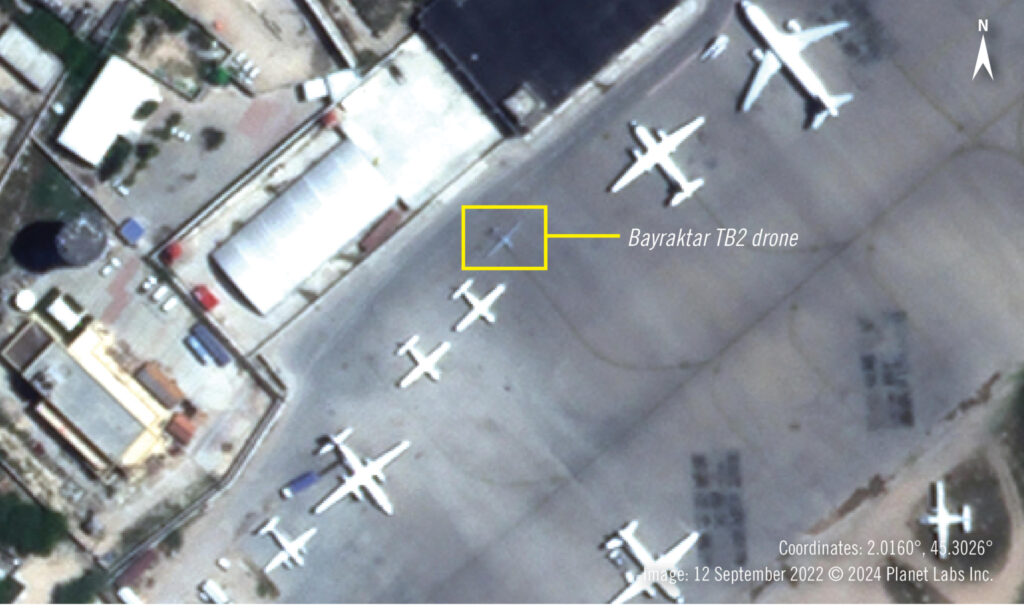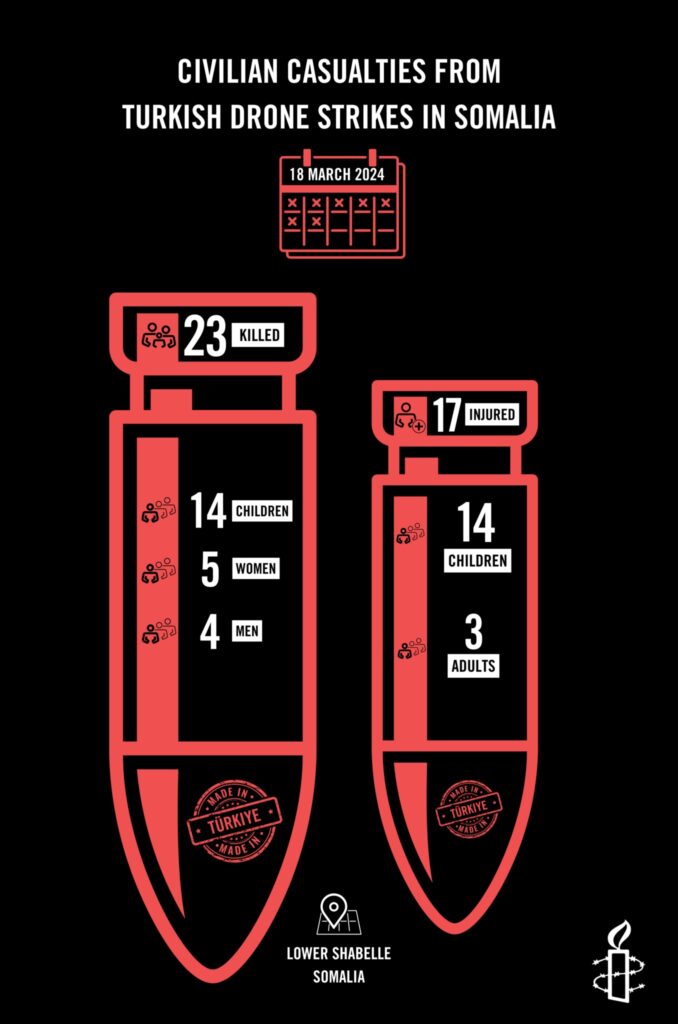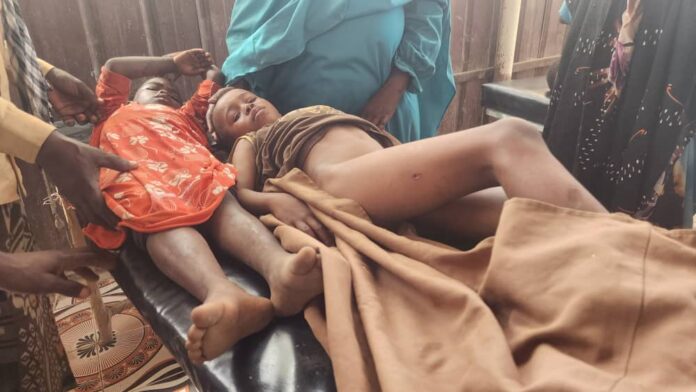MOGADISHU (KAAB TV) – Two strikes that killed 23 civilians during Somali military operations supported by Turkish drones must be investigated as war crimes, Amnesty International said today.
Civilians killed in the strikes on 18 March 2024 included 14 children, five women and four men. Another 17 civilians were injured in the strikes: 11 children, two women and four men. All are from the marginalized Gorgaarte clan.
The strikes hit the Jaffey farm, about three kilometres west of Bagdad village in the Lower Shabelle region, between 8pm and 8.30pm. Victims and other residents told Amnesty International that the drone strikes followed heavy ground fighting that started earlier that day between the armed group Al-Shabaab and Somali security forces close to the villages of Jambaluul and Bagdad.
“The Somali and Turkish governments must investigate these deadly strikes as a war crime, and put an end to reckless attacks on civilians,” said Tigere Chagutah, Amnesty International’s Regional Director for East and Southern Africa.
“In Somalia, civilians have borne the brunt of suffering in war far too often. These horrific deaths must not be overlooked. The devastated survivors and their families deserve truth, justice and reparations.”
Amnesty International remotely interviewed 12 people, including four victims and eyewitnesses, and four family members of victims. Researchers also reviewed satellite imagery and medical reports, analyzed photos of victims and weapons fragments, and geolocated videos from the scene of the attacks and of Turkish drone operations at Mogadishu International Airport.
Based on the photos of the munitions scrap metal, Amnesty International’s weapons investigator was able to confirm that the strike was conducted with MAM-L glide bombs, which are dropped from TB-2 drones. Both are manufactured by Türkiye. Attacks that fail to differentiate between military objectives and civilian objects are indiscriminate and may amount to war crimes.

Deadly strikes
According to an eyewitness interviewed by Amnesty International, Al-Shabaab fighters were present in Bagdad during clashes on 18 March. An initial drone strike hit a mosque in the eastern side of Bagdad at around 7.30pm, destroying the building and damaging nearby houses. Amnesty International was not able to independently verify who was targeted in the mosque, or if there were any casualties.
Following that attack, eyewitnesses said many civilians fled to the Jaffey farm to seek refuge. The first strike on the farm killed and injured several civilians. A second attack, approximately 30 minutes later, killed and injured more civilians who had arrived from the neighbouring villages of Alifow and Gaalgube to rescue survivors following the first strike.
On 19 March, Somalia’s Ministry of Information issued a statement saying that they had killed over 30 Al-Shabaab militants in the villages of Bagdad and Baldooska in coordination with “international partners”. The statement added: “The operation was launched in response to intelligence reports indicating that Al-Shabaab fighters were gathering in these areas and planning an assault against the Somali people… 15 Al-Shabaab members were killed in an airstrike in Bagdad.”
It is unclear whether Turkish or Somali forces were in control of the TB-2 drone at the time of the strikes on Jaffey farm. One source in the Somali government told Amnesty International that members of the National Intelligence and Security Agency fly the TB-2s during combat operations against Al-Shabaab. However, in 2022, the UN Panel of Experts for Somalia reported that, according to the Turkish government, Türkiye did not transfer the drones to Somalia in violation of the UN arms embargo, but rather operates the drones themselves “in the fight against terrorism”. Also in 2022, Ahmed Malim Fiqi, Somalia’s then Interior Minister who is now Foreign Minister, was reported to have said that while Turkish forces operate the drones, Somali commanders provide the targets.
In recent years, Türkiye has provided military equipment and support to Somalia. Satellite imagery and videos geolocated by Amnesty International’s Crisis Evidence Lab show Turkish TB-2 drones on the runway at Mogadishu International Airport as early as 12 September 2022. After years of training the “Gorgor” unit of the Somali armed forces at Türkiye’s Camp Turksom in Mogadishu, the two countries signed a Defense and Economic Cooperation Framework Agreement in February 2024.
On 5 April, Amnesty International sent letters to the governments of Somalia and Türkiye, asking for details on the 18 March operation, including which military’s forces were controlling the drone at the time of the strikes. At the time of publication, neither government had replied.

‘There were screams, blood, and bodies all over the ground’
Amnesty International established that a total of five families belonging to the Gorgaarte clan were impacted by the two strikes on the Jaffey farm.
Maalim Adan Hussein Hassan Adow, a 49-year-old farmer, lost his wife, Asli Buule Hassan, 40; his son Dahir Maalim Adan, 14; and his two daughters Ishwaq Maalim Adan, seven, and Asma Maalim Adan, six. His two nephews Abdi Ibrahim Duqow, seven, and Salah Ibrahim Duqow, nine, were also killed. His 30-year-old sister Fadumo Hussein Hassan Adow suffered a head injury and later died in Digfeer Hospital in Mogadishu.
Maalim Adan Hussein Hassan Adow said he could not understand why his family was targeted. He told Amnesty International: “My wife, my three children and two nephews were all killed in the first strike that hit the farm. I was in Afgoye at the time. I immediately received a phone call from my relatives. It was not possible to travel at night for security reasons. I travelled to Bagdad the morning of the following day.
“I identified the bodies of my wife and children at the scene. My wife and children were buried in one mass grave in Gaalgube village, while my nephews were buried in Alifow village. I don’t know why my family was targeted during the holy month of Ramadan. I am heartbroken.”
Ismail Ali Deerey, a 37-year-old farmer, and his son Sadam Ismail Ali Deerey, aged nine, were also killed. His wife, two daughters, two sons and nephew were injured, and received care at hospitals in Mogadishu.
Mohamed Ali Deerey, Ismail’s elder brother, told Amnesty International: “I was in Alifow village. We heard a deafening blast. Soon after, I received news that my brother Ismail had been struck by a drone attack. My son and I hurried to the farm. Upon reaching the farm, another [blast] targeted us covering the area in a cloud of dust.
“The scene was chaotic. There were screams, blood, and bodies all over the ground. I luckily survived but my 22-year-old son, Ali Mohamed Ali Deerey, who was with me was seriously injured in his back… My brother Ismail and his son were brutally killed.”
A relative of another family who lost six people, including three children, said: “I am horrified by what happened to my relatives. This is inhumane. This is a massacre.”
The Somali government has a history of not providing reparations for civilian casualties of military actions, or seeking reparations from foreign actors when they are involved in unlawful attacks. It also has a history of ignoring violations against marginalized communities, such as the Gorgaarte clan.
An elder from the Gorgaarte clan said: “We feel neglected and unheard, with no one advocating for us or engaging in dialogue with us. There has been no explanation provided for the actions taken against my people, no follow-up investigations, and no offer of sympathy. Our priority is to receive information about why this tragic event occurred. We also need compensation for the losses we have suffered.”
Background
The armed conflict between the government of Somalia and Al-Shabaab continues to have a devastating impact on the country’s civilian population, with all parties to the conflict committing serious violations of international humanitarian law.
Amnesty International has documented a series of air strikes by the United States Africa Command (AFRICOM) that have killed and injured Somali civilians, including many as a result of apparent violations of international humanitarian law. On 5 April, Amnesty International wrote to AFRICOM, asking if US forces were involved in the 18 March operation against Al-Shabaab, but they did not reply by the time of publication.
(Source: Amnesty International)


